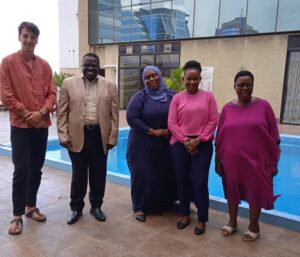FACT FINDING MISSION REPORT – TANZANIA 28TH – 31ST MARCH

Part of the discussion team in Tanzania from left Valeria(Comslo), Action (IBE Vice President), Mary (Centre For Crisis Resolution), Fideso Uiso (Tanzania Epilepsy Association), Aisia Matowo (Parenta for Children with Epilepsy in Tanzania)
BACKGROUND:
IBE Africa commissioned a fact finding mission on the discriminatory marriage act in Tanzania. The aim of the mission was to partner work with IBE local chapters (Parents of Children with Epilepsy in Tanzania and Tanzania Epilepsy Association) and the legal human rights institutions in Tanzania. Since legislative change comes slowly, IBE Africa and its partners aimed to build on legislative proposals and develop a test-case for human rights litigation using domestic courts or alternatively use Parliament to repeal the discriminatory sections on the law herein referred.
The IBE Africa Vice President met with partner attorneys and discussed the developed a twin track approach – advocacy and litigation. The later would require filing the papers with the courts for an interpretation of the discriminatory sections/ The outcome of the course case would then be used as “driving force” for the amendment.. Should both legislative and judicial approaches fail, our partners will have laid the groundwork for turning to regional or international human rights bodies. In this way, the IBE Africa, IBE Chapters in Tanzania and its partners maximize the chances of ensuring the existing discriminatory sections are amended.
Tanzania has had THE LAW OF MARRIAGE ACT (1971) since 1971, which both supports and discriminates against people with epilepsy by allowing marriages to be annulled due to epilepsy, as follows;
- Voidable marriages
Subject to the provisions of sections 97 and 98, a marriage shall be voidable if–
(a) At the time of the marriage–
(ii) Either party was subject to recurrent attacks of insanity or epilepsy;
(c) Annulment (ss 96-98)
- Power of court to annul avoidable marriage
(1) The court shall have power to grant a decree of annulment in respect of any marriage which is voidable under the provisions of section 39:
Provided that–
(a) where the petition is founded on an allegation that at the time of the marriage the respondent was subject to recurrent attacks of insanity or epilepsy or was suffering from venereal disease in a communicable form or was pregnant by a person other than the petitioner, the court shall not grant a decree unless it is satisfied.
The Mission enabled the IBE Africa and Lawyers for Epilepsy Network to get acquainted with the development of the law and familiarize with practical possible implementation of amending the provision of this law as stated above. Fact-finding will also play an important role in raising human rights awareness for proposed legislation amendment. Through the interviews, the IBE Lead person had the opportunity to meet with diverse human rights officials and community members and other legal professionals for their views.
PARTICIPANTS:
- Tanzania Human Rights Defenders Coalition – Advocate Paul Emmanuel Kilasa Kisabo
- Legal and Human Rights Centre – Advocate Anna Henga
- Crisis Resolution Centre – Advocate Maryam Kissibe
- Tanzania Epilepsy Organization (IBE Chapter) – Fideso Uiso
- Parents of Children with Epilepsy in Tanzania (IBE Chapter) – Aisia Matowo
- COMSLO Italy – Valerio Topazio
- Steven Mark Ali – general public
- Enara Juma- general public
- Andrew Sande – general public
FINDINGS:
At least four reported cases of epilepsy-related divorces have been handled by an Advocate with the Centre for Crisis Resolution who is also a Certified Marriage Counsellor. More cases could be retrieved because the Centre was unaware of the discriminatory Act at the time of handling. The assertion that people with epilepsy should not marry is popular in Tanzania, according to the Legal Human Rights Centre, and this practice has gone unchallenged due to a lack of knowledge about epilepsy and the law among the legal community and the general public. It was noted that the Act in question was under review and the process was halted as it touched political and religious nerves in the country discussions were resumed in 2021. The most people who have been affected epilepsy related divorces are poor Tanzanian citizens who are not aware of any redress that can be sought. The mission also sought the opinions of three members of the public on the topic of epilepsy and marriage, and the responses were as follows:
“It is a well-known fact in our community that marrying someone who has epilepsy is a curse and that such a union will not be blessed by God.” Respondent A
“I’m aware of incidents when epilepsy has caused women to divorce their partners…….” Respondent B
“I would not marry someone who has epilepsy since it will affect my children, who will develop epilepsy as well.” I’m not familiar with the law you’re referring to. But, law or no law, I will not marry somebody who has epilepsy.” Respondent C
The Tanzania Human Rights Defenders Coalition concurred with the other participants that the law was discriminatory and stigmatizing, and that it was a serious infringement.
KEY DISCRIMINATORY FACTS:
The Law of Marriage Act (LMA) [Cap 29 R.E. 2019] was adopted by the United Republic of Tanzania’s Parliament in 1971, and it went into effect immediately after the President of the United Republic of Tanzania gave his approval. The violations that were identified of 39(a) (ii) were that it;
- Denies the right to marry to someone who has epilepsy or has recurring seizure attacks.
- Refuses to allow a person with epilepsy or repeated seizure attacks to enjoy basic human rights.
- Increases stigmatization of a person with epilepsy or repeated seizures by the other spouse and community members.
- Does not establish an epilepsy threshold or levels
- Is ambiguous and open to misuse by the other spouse.
- Does not take into account the fact that epilepsy is treatable.
Submitted by: Action Amos – Vice President, IBE – Africa


